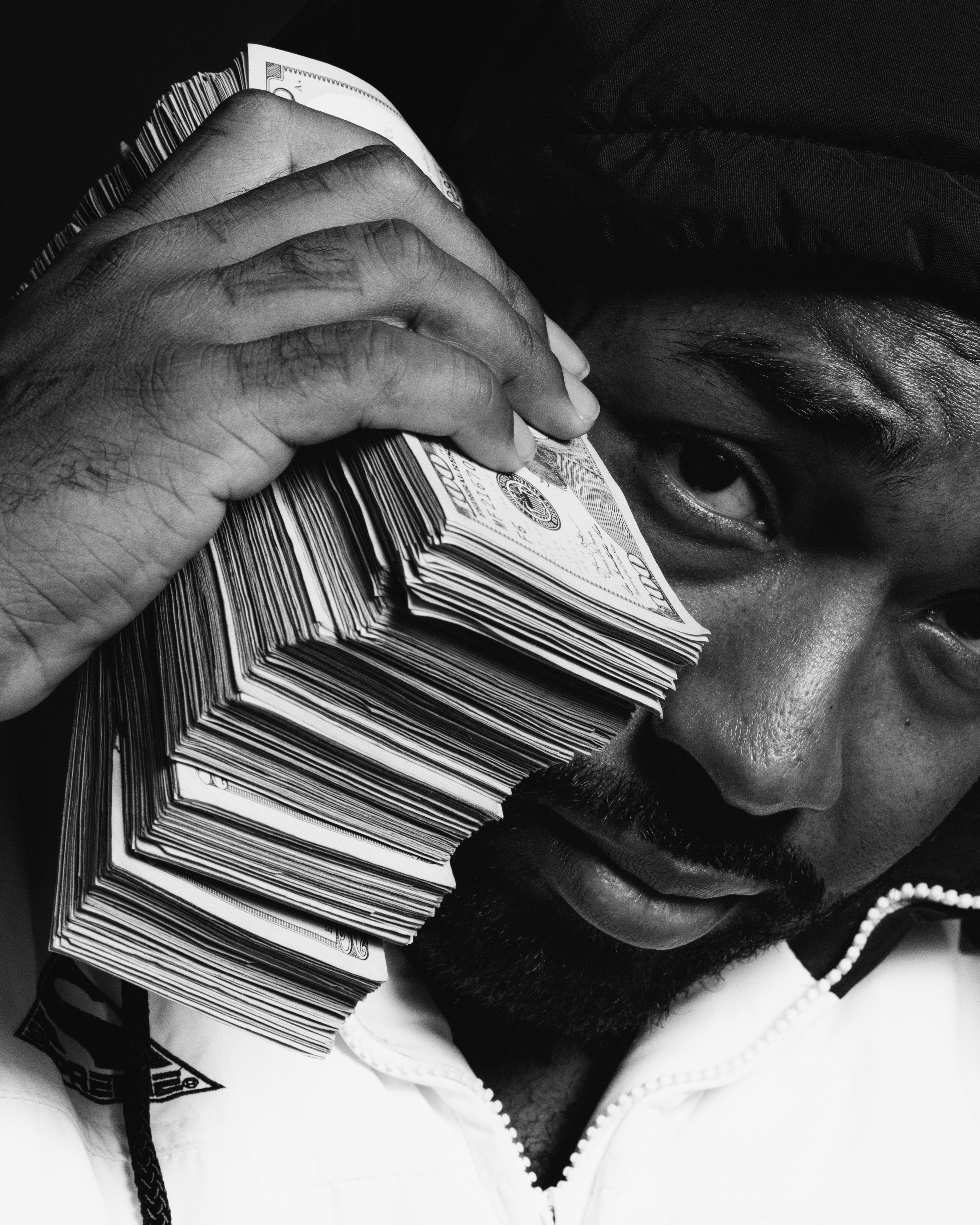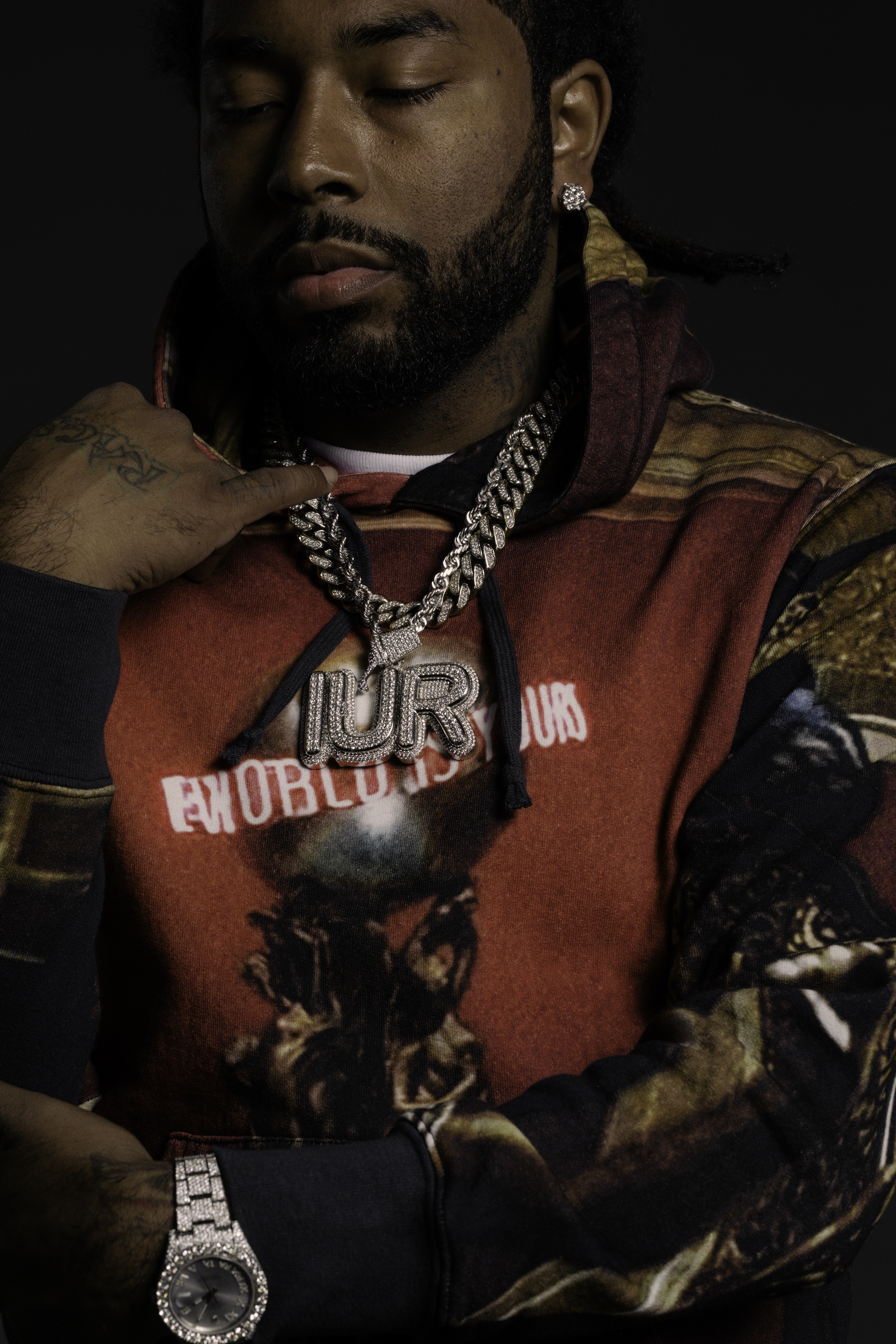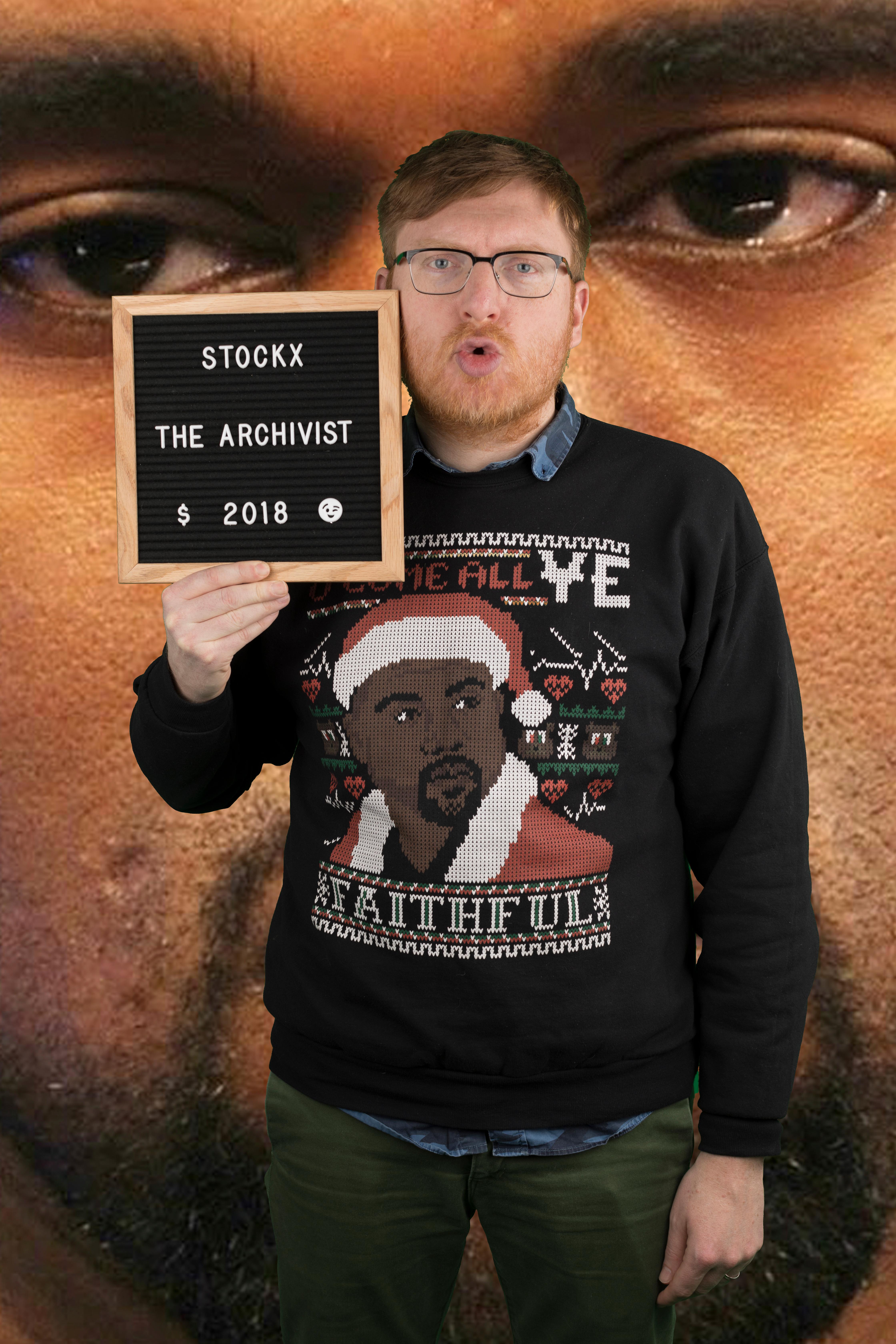Detroit and Motown Record’s very own Icewear Vezzo recently visited StockX to go “Off the Top” and talk about his music, style, and life in Detroit. Vezzo offers insight into his childhood growing up in Minneapolis and Detroit, his love of Jordans, and the impact Tupac had on his mother and his writing.
Becoming Vezzo
Born Chivez Smith, the underground king of Detroit hip-hop known as Icewear Vezzo goes by multiple names. In addition to Icewear Vezzo, he’s also known as The Drank God. When asked about the origins of his various monikers, his answers range from the causal to the commercial. Explaining the genesis of The Drank God, Vezzo is very matter of fact: “I used to sell codeine.”
His adoption of Icewear Vezzo was the result social media and his promotion of a mixtape, circa 2012. Vezzo says, “I had a mixtape out called ‘Icewear’ and I was promoting it on Twitter.” He continues, “my name was Young Vezzo at the time, and my Twitter handle was Icewear Vezzo, so I guess people started calling me Icewear Vezzo.” There was no way to walk back his new name, so he decided to run with it. He’s been Icewear Vezzo ever since.

Gangsters, Hustlers, and Love
Vezzo’s family is 100% Midwestern but split between his mom’s family in Minneapolis and his dad’s family in Detroit. He was born in Minneapolis but moved to Detroit when he was five. According to Vezzo, Minneapolis and Detroit are completely different. The only thing that links both locales in Vezzo’s mind is the fact that he experienced “nothing but love” in both cities.
The difference between Minneapolis and Detroit boils down to the difference between gangs, gangsters, and hustlers. “Minneapolis is gangland: It’s all gangs, big gangs everywhere. Detroit is more of a hustlers town,” Vezzo says. This is a distinction more of degree than kind, though. As he says, “the streets are crazy both places, but they’re different. Detroit is not like gangs, it’s neighborhoods.” In Detroit, the neighborhood provides some of the basic DNA of your identity. In Minneapolis, gangs control the blocks so much so that Vezzo says, “if you’re not in this gang, you shouldn’t even be in this hood.” He elaborates, “It’s like the GDs are right here, the Vice Lords are over there, the Crips are there, and the Bloods are right there. You’ve got the IVL, the CANs and STO, the BDs and Bogus Boys, it’s that type of place.”

Growing up on 6 mile road in Detroit, Vezzo paints a portrait of his parents as hustling, if not necessarily as hustlers. He says “My parents don’t do anything; they’re just good parents.” Although Vezzo doesn’t recall any official job title his mom held, he says “my life was good growing up, to be honest with you. My mom gave me everything. She always worked hard.” Although Vezzo knew he could always count on his mom, it was still a struggle, “we had roaches and shit, but we was cool,” he adds. No matter what, though, Vezzo was never worried about where he would sleep or if he would have clothes to wear: “what she did for rent, I don’t know. We never got evicted; she was never late with rent. If I asked for Jordans, I got it.”
And most important of all, he says, “I was raised with love, there was no hate in my household.”
Midwestern Craftsmanship
In an interview with Publisher’s Weekly the Ohio writer Donald Ray Pollock said he taught himself to write at the age of 45 by typing out short stories from authors he admired to “get closer to the work” and figure out how these writers wrote. Vezzo shares this same origin story with his fellow Midwestern writer. Vezzo would record songs he liked from the radio and write down what he heard so he could figure out what the song was saying. He would slowly hit ‘play’ and ‘stop’ and write out a few words at a time until he had written out an entire verse. He said, “it probably took me an hour or two to write down one verse.” But that was Vezzo then and that is Vezzo now: dedicated to the craft. “I had all the time in the world,” he smiles, “that was fun to me.”
By the time Vezzo was 7 or 8 all he wanted to do was become a rapper. “All I wanted for Christmas was turntables. But I’m a kid so my mom got me the toy version, but I wanted the real thing!” So she ended up getting Vezzo a karaoke machine, and that’s what he used to record his first songs. Unfortunately, Vezzo didn’t save any of these early recordings but he still remembers every bar of the first rap he wrote when he was 12. Vezzo cracks a grin, “I wrote my first rap to Jay-Z’s “Nigga What, Nigga Who (Originator 99).”
So I Gotta Make the Song Cry
When the news broke that Tupac Shakur died, Vezzo’s mother broke down in tears. This left a lasting impression on Vezzo. He says, “she was crying like she just lost an uncle. We had to hug her tell it would be ok.” Remembering how stoic his mom was back then, Vezzo gets serious, “she had a reason to cry every day, but she didn’t.” But she did when Tupac passed.
The ability to elicit such strong emotions is why Vezzo is a musician. He loves music; he believes in the power of music. Discussing music, Vezzo says, “music is the world, it controls emotions.” Getting profound, he says, “it can stop or start a gunfight. It brought cultures together.” Offering up his version of music as a Detroit Dialectic, Vezzo muses that music plays a “part in ending racism, but it can also enhance it.” This struggle in music to guide the hearts and minds of listeners is what elevates music from a hobby or pastime to a true artist praxis, a way for Vezzo to interpret the world.

But music and rap are not always freighted with such deep and heavy emotions for Vezzo. Grinning, Vezzo says, “I like the fun part of it, too. I like Migos.”
NOLA on 6 Mile
Although Jay-Z and Busta Rhyme spurred Vezzo to figure out how to write, it would be rappers from New Orleans that made Vezzo want to become an MC. From Master P’s No Limit camp, Juvenile’s album “400 Degreez” ranks as Vezzo’s favorite album of all time. Vezzo says, “Juvenile was what Detroit was and represented even though he was from NOLA.” Everything that Juvenile was rapping about Vezzo saw growing up: “I was watching all the older guys with their gold rims, black Benzes, sagging in their Girbauds, with their Tims and Air Force 1s and Rolexes, it was lit,” he laughs. Further explaining the Detroit and New Orleans connection, Vezzo says, “Juvenile was what Detroit was at one point. We didn’t listen to east coast rap in my neighborhood. We listened to Master P and Juvenile, and Jigga–I mean Jay-Z is Jay-Z, he’s always been top–but for the most part, who influenced us and made us want to rap? It was No Limit and Cash Money.”
The cultural geography of New Orleans was more of a fit with Detroit, too. Vezzo was often confused when he listened to Jay-Z. “He would talk about boroughs and everything, that wasn’t our culture,” Vezzo confesses. It was the complete opposite when Vezzo listened to Juvenile, Master P, or any No Limit or Cash Money record, everything clicked. He says, “When Juvenile and P talked about the projects and ‘Dope Fiend Willy’ and crack heads running across the field, I seen that shit. I lived that shit.” Making the connection between north and south explicit, Vezzo recounts, “I never saw anyone hustle on the corner; I saw them hustle out of houses. I felt like I knew Juvenile; I did know him: my Uncle was Juvenile and Master P growing up.”

Staying Fresh, Staying Fly
Fashion and style have always played an important role in Vezzo’s life. Although he’s always been fashionable, he’s never really chased trends. Describing his style, Vezzo says, “I don’t have a style, I just put shit on. My shit is crazy. I just get fresh and put it together.”
When Vezzo was in the 6th grade, he began to rock head-to-toe Guess fits. Vezzo laughs, “I had the jeans and the jackets!” To further set off his style, he would wear a Leather Avirex jacket with a shearling lining. By his own account, he was the most popular kid in the 6th grade. With a shrug, Vezzo says, “I was always popular in school because I was bad and a clown and a lot of girls noticed me too because I knew how to dress.”

As always, his mom was his secret weapon. She worked at AJWRIGHT and helped shape his wardrobe. He mentions one memorable ensemble: “I wore the yellow Avirex coat, the Jordan 11 cool greys, it was lit!” Bemused, Vezzo grins “it was so lit the 8th graders were mad at me.”
Modesty aside, Vezzo has always been able to stay fashionable. When he was little, he knew right away that Jordans were different from other sneakers. “I was young but I knew how serious they were,” he remembers, “I used to smell the inside of the motherfuckers.” Although Vezzo admits that he likes most Jordan models, the Jordan 1s and 11s are his favorite. When the Jordan 11 Columbia colorway dropped, his mom took him to the store to buy a pair. For the time it took to pay for the shoes, Vezzo was elated. His euphoric bubble burst when his mom told him he couldn’t wear the shoes outside the store. Serious business, indeed.
Although Vezzo swears by the Jumpman, he also likes to rock Yeezy’s as his everyday pair. “They’re comfortable and you put them on and do what you want,” he continues, “I have a couple pair and I love them: I go the studio; I go to the mall; I take a meeting.”
The Clothes Make the Man
When it comes to clothes, Vezzo follows the sartorial advice of Malcolm X and the belief that “dressing well builds your character.” But Vezzo isn’t invoking some reductive vision of respectability politics, he’s talking about personal comfort. Dressing well, for Vezzo, is all about “looking comfortable and feeling good.” Fashion, style, and building character is an idiosyncratic pursuit for Vezzo.
The rules are different for watches, though. Vezzo swears by Malcolm X when it comes to his watch game. Malcolm X said “I have less patience for someone who doesn’t wear a watch than with anyone else . . . I live by my watch . . . Time is more important than distance.” Yes, Vezzo admits, “watches feel good” but they’re mandatory. Sagely, Vezzo concludes “every man should have a watch.”
“I had an iced out Gucci and it was trash,” Vezzo explains about his first, real watch. He continues, “I shot like 8 videos in it and you couldn’t tell me shit.” At $900 it was some expensive trash, but Vezzo says “now I have a $30K watch.” And he’s still looking to upgrade: “I want a Richard Mille, but I can’t afford it.” He amends this last statement and says, “I can afford it, but I just don’t want to spend the money yet.”

From Motown to Motown
One of Vezzo’s titles is the CEO of Iced Up Records. But he’s even more excited about his newest role, being signed to Motown Records. Vezzo says, “I came home to a blessing. It feels like I play for the Pistons. It’s the home team Motown Records!” As Vezzo preps his major label debut, he can’t stop thinking about an earlier era of Detroit and Motown music. “I saw TRL with Sway on it, and he was talking to a guy who didn’t know who Berry Gordy was,” says Vezzo. He continues, “Gordy created opportunities for the entire race and this guy didn’t even know.” Now, Vezzo is a part of that story, that history. “Motown is like a miracle; it’s a blessing,” he marvels.
Always Detroit
Besides the fact that Vezzo makes great music, people support him because he works hard to be authentic and stay grounded. This means that he always tries to represent Detroit and the Detroit from where he grew up. According to Vezzo, “I represent the streets; I feel like I help bring a certain part of Detroit to light.”
In addition to talking about and honestly representing the struggles many in the city go through and have gone through, Vezzo is also quick to point out the many great things Detroit offers. Vezzo thinks people should know that Detroit fosters a community of incredibly talented, cultural trendsetters. For the most part, people in Detroit are ignored: “our voices haven’t been heard,” he says. Elaborating he says, “we’re good people. We stick together. It’s all love in Detroit.” To emphasize his point, Vezzo finishes “Detroit is really a city for the city; everybody supports everybody in Detroit.”
Vezzo thinks there needs to be a balance to the way Detroit is portrayed. He argues that media representation is accurate, but people only focus on one part of life in Detroit. Sure, the reporting is accurate but too selective. He says they’re “only speaking about the fingers, but what about the rest of the body?” Vezzo wants the positive as well as the negative to be reported. He asks “what about companies coming back to Detroit and giving people opportunities?” He continues, “I did a charity event for a mental health non-profit at Ford Field and it didn’t make the news.” With a sigh, Vezzo says “I didn’t see a single reporter there.”

Always Hungry
Since coming home after spending over a year in federal prison, Vezzo has rededicated his life to his art and family, and he’s achieved success. But when will he know that he’s succeeded, that he’s made it? “I don’t think I will know,” he shrugs, “I just don’t know. The more I elevate in life, the more I get used to it.” With each new success, there’s more he wants to do, and succeed at doing.
Just like his city, Vezzo continues to grind it out for himself, his family, and his fans.




